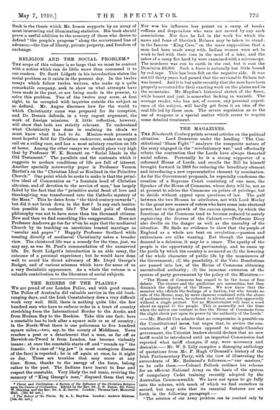RELIGION AND THE SOCIAL PROBLEM.* THE scope of this volume
is so large that we must be content with a notice which can do little more than commend it to our readers. Dr. Scott Lidgett in his introduction states the social problem as it exists in the present day. In the twelve essays which follow twelve writers, who make up a quite remarkable company, seek to show us what attempts have been made in the past, or are being made in the present, to solve this problem. Two of the twelve may seem, at first sight, to be occupied with inquiries outside the subject as so defined. Mr. Angus discusses how far the world to Which Christianity came was prepared for its reception, and Dr. Dennis defends, in a very cogent argument, the work of foreign missions. A little reflection, however, will show that both are strictly relevant. To understand what Christianity has done in realising its ideals we must know what it had to do. Mission-work presents a most hopeful field for Christian endeavour, makes an urgent call on a ruling race, and has a most salutary reaction on life at home. Among the other essays we should place very high that by Professor W. K. Bennett on " Social Ideals in the Old Testament." The parallels and the contrasts which it suggests to modern conditions of life are full of interest. Another specially noteworthy paper is Professor Vernon Bartlet's on the " Christian Ideal as Realised in the Primitive Church." One point which he seeks to make is that the primi- tive ideal of Communion as " a fountain head of Christian altruism, and of devotion to the service of man," has largely failed by the fact that the "primitive social feast of love and thanksgiving was transformed into the Catholic mystery of the Mass." This he dates from " the third century onwards "; but did it not break down in the first ? Is any such institu- tion possible in modern life P The ideal polls of Greek philosophy was not to have more than ten thousand citizens. Now and then we find something like exaggeration. Does not Professor Andrews go too far when he says that the mediaeval Church by its teaching on asceticism treated marriage as "secular and pagan" ? Happily Professor Scullard while treating directly of mediaeval Christianity takes a broader view. The cloistered life was a remedy for the time, just, we may say, as was St. Paul's commendation of the unmarried life. Dr. Scott Lidgett's introduction is an able essay, the outcome of a personal experience ; but he would have done well to avoid his direct advocacy of Mr. Lloyd George's Budget, and of various schemes which have for some of us a. very Socialistic appearance. As a whole the volume is a valuable contribution to the literature of social subjects.










































 Previous page
Previous page